Introduction
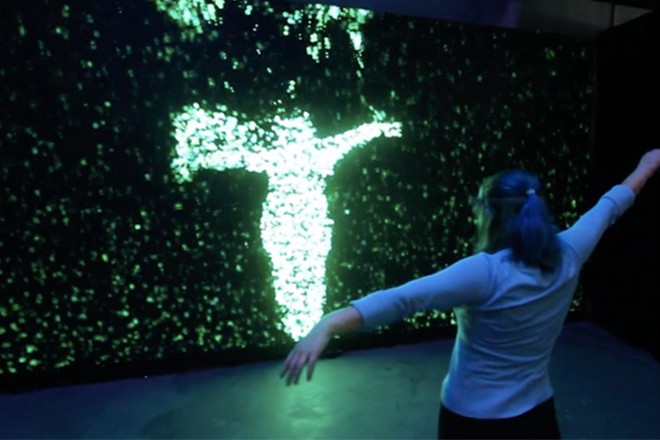
Entering the new digital era, interactive Afficheurs LED are quietly revolutionizing our visual and information life. It’s everywhere from street advertising to classroom blackboards to home entertainment. This article takes you through the diverse applications of interactive LED displays and reveals the secrets of the technology. Let’s take a look.
1. Advantages of interactive LED displays
Driven by the wave of digitalization, interactive LED displays have become an important driver of modern information dissemination and user experience upgrades with their unique technical characteristics and wide range of application scenarios.
Below, we will analyze the significant advantages of interactive LED displays in detail from several key dimensions, allowing you to more intuitively understand why they are so popular.
1). Excellent visual expression and appeal
- Haut luminosité and color saturation:
The interactive LED display uses advanced LED light source technology to display extremely high brightness and rich color saturation, ensuring clear images and bright colors even in strong outdoor light environments. Attract the attention of passers-by.
- Immersive visual experience:
Through ultra-large area display, curved surface design or splicing technology, interactive LED displays can create stunning visual effects, making the audience feel as if they are in the picture and enjoy an immersive viewing experience.
2). Flexible interaction methods and personalized content
- Diversified interaction modes:
Unlike traditional displays, interactive LED displays support multiple interaction methods such as multi-touch, gesture recognition, and voice recognition.
Users can freely choose the most suitable interaction mode according to their preferences and needs. , achieving a more natural and smooth operating experience.
- Personalized content customization:
With the help of advanced software technology, interactive LED displays can easily achieve personalized content customization. Whether it is corporate promotion, educational display or entertainment interaction, we can design unique and attractive content according to specific needs to enhance audience participation and satisfaction.
3). Efficient information transfer and team collaboration
- Real-time updating and sharing:
The interactive LED display supports real-time updating and sharing of information. Whether it is news information, weather forecasts, or meeting agendas, it can be presented to the audience for the first time, ensuring the timeliness and accuracy of the information.
- Team collaboration and remote meetings:
In conference rooms or remote collaboration scenarios, interactive LED displays can serve as a center for information exchange, supporting multiple people to participate in discussions and annotations at the same time, improving team collaboration efficiency and decision-making speed.
At the same time, through the remote conferencing function, real-time cross-regional interaction can be achieved, breaking geographical restrictions and promoting communication and cooperation on a global scale.
4). Wide range of application scenarios and flexibility
- Commercial retail:
In retail places such as shopping malls and supermarkets, interactive LED displays can be used as a powerful tool for advertising displays and promotional activities to attract customers’ attention and increase sales.
- Public information and transportation:
Dans les pôles de transport tels que aéroports and train stations, interactive LED displays can update flight and train information in real-time, provide convenient navigation services, and improve the passenger travel experience.
- Educational entertainment:
Dans le domaine de éducation, interactive LED displays can be used as the core equipment of smart classrooms to support interactive teaching and distance learning; in the field of entertainment, they can be used as a carrier for game interactions, movie screenings and other activities, providing a rich entertainment experience .
5). Energy conservation, environmental protection and sustainable development
- Low energy consumption and long life:
The interactive LED display adopts advanced energy-saving technology, which can reduce energy consumption while ensuring the display effect.
At the same time, LED light sources have the characteristics of long life, reducing replacement frequency and maintenance costs, and are in line with the concept of sustainable development.
2. What types of interactive LED displays are there?
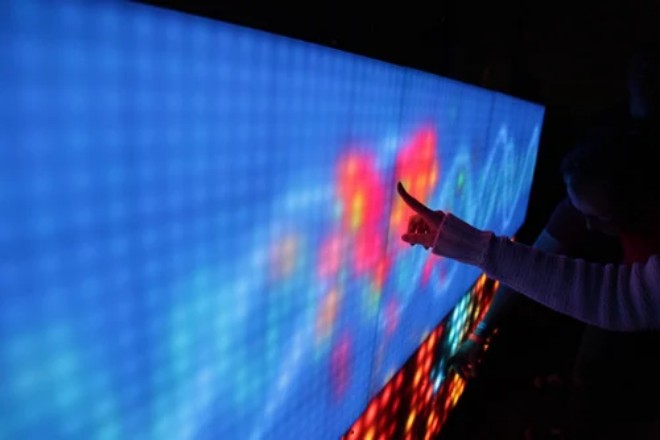
1). Touch interactive LED display
The touch interactive LED display is a display device that combines LED display technology and touch technology. Users can interact by directly touching the content on the screen, such as sliding, clicking, zooming, and other operations.
The principle is to add a layer of touch film or touchpad to the surface of the LED screen so that users can interact with the screen directly through their fingers.
1.1). Caractéristiques:
Intuitive: Users can operate directly with their fingers on the screen without the need for additional controllers or keyboards.
Interactivity: Users can interact with content on the screen in real time for a richer experience.
Flexibility: Different interaction methods and functions can be customized according to user needs.
1.2). Application scenarios:
Commercial display: such as shopping mall shopping guide systems, product display cabinets, etc. Users can learn product information through touch screens.
Information query: Such as public transportation query system, self-service ticket vending machine, etc. Users can query the required information by touching the screen.
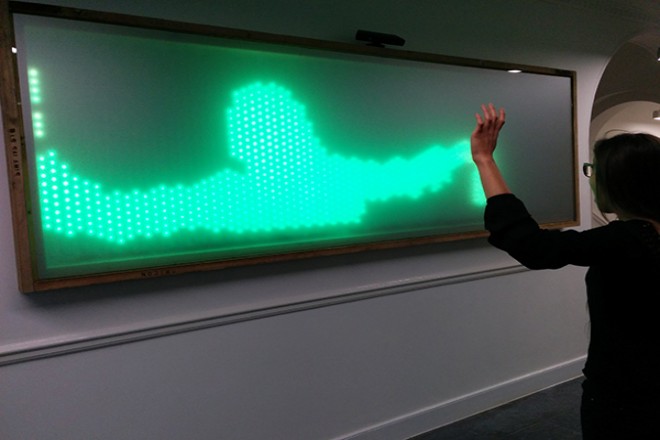
2). Non-touch interactive LED display
Non-touch interactive LED displays do not rely on the user’s direct contact but use other methods (such as gesture recognition, voice recognition, etc.) to capture the user’s interactive intentions and interact with the content on the screen.
The principle is to install an infrared sensor on the LED display screen, which will capture the human body after it is sensed.
2.1). Caractéristiques:
Non-contact: Users do not need to touch the screen directly and can interact with the screen through gestures, sounds, etc.
High-tech feel: Touchless interaction methods often give people a high-tech, futuristic feel.
Wide applicability: Suitable for scenarios where it is impossible to touch the screen directly or where a higher level of interactive experience is required.
2.2). Application scenarios:
High-end display: For example, interactive exhibitions in museums, art galleries and other places, users can browse exhibit information through gestures or voice commands.
Conference speech: In the conference room or lecture hall, the speaker can control the playback and switching of PPT through gestures or voice to improve the smoothness and interactivity of the speech.
3. Interactive LED displays are suitable for installation scenarios
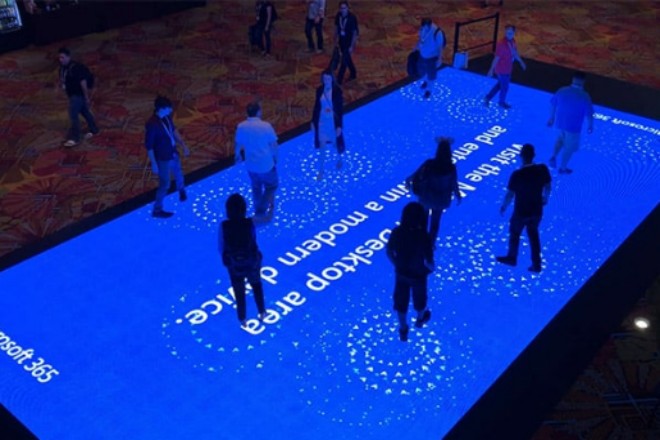
1). Commercial retail and advertising
1.1). Inside the mall
- Promotional information display:
Imagine that when you walk into the mall, a huge interactive LED display is scrolling to display the latest promotions and coupon information. With just one touch, you can learn more about the event details and even receive coupons directly. Isn’t it very convenient?
- Brand interactive experience:
In specialty stores or brand exhibition areas, interactive LED displays can display 3D models of products, usage tutorials or customer reviews. Not only can you watch, but you can also try on items virtually by touching the screen, as if you were in a real shopping environment.
1.2). Outdoor advertising
- City landmark:
In bustling commercial districts or transportation hubs, huge interactive LED displays become a beautiful landscape of the city.
It can not only attract the attention of passing pedestrians, but also interact with pedestrians through gesture or voice recognition technology, such as displaying weather forecasts, traffic information or offers from nearby businesses.
2). Public services and information dissemination
2.1). Transportation hub
- Information navigation:
At airports, train stations or subway stations, interactive LED displays can provide real-time flight information, train schedules, arrival reminders, etc. to help passengers quickly find their destination.
At the same time, it can also be used as an interactive inquiry system to provide passengers with route planning, ticket inquiry and other services, greatly saving inquiry time.
2.2). Gouvernement Service Center
- Government Information Disclosure:
The interactive LED display in the Government Service Center can update policy information, service guides, announcements, notices, etc., in real-time, allowing citizens to more easily understand government work dynamics and government service processes.
Citizens can also inquire about service procedures, make reservations, etc., through the touch screen, which improves the transparency and efficiency of government services.
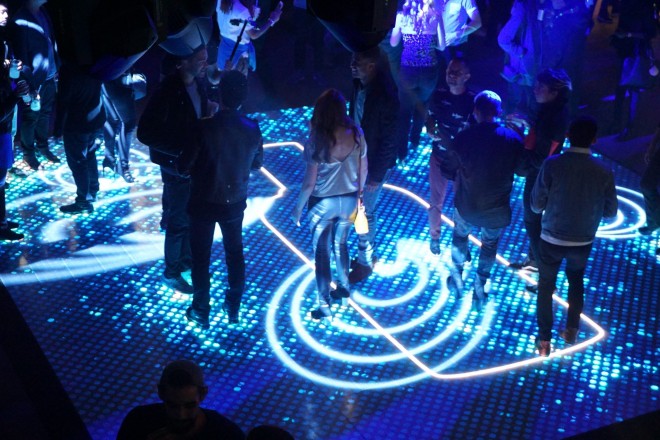
3). Entertainment and Leisure
3.1). Concerts and music festivals
- Organiser interaction:
At a concert or music festival, the interactive LED display can be used as a stage background to display dynamic images and special effects to enhance the performance.
Audiences can participate in interactive games or voting activities by touching the screen and interacting with performers in real-time, which increases participation and entertainment.
3.2). Entertainment venues
- Création d'ambiance :
In entertainment venues such as nightclubs and bars, interactive LED displays can play light shows, interactive effects, etc., to create a unique atmosphere. Customers can choose music, adjust lighting, etc. by touching the screen to enjoy a personalized entertainment experience.
4. How do you determine whether your scene is suitable for installing interactive LED displays?
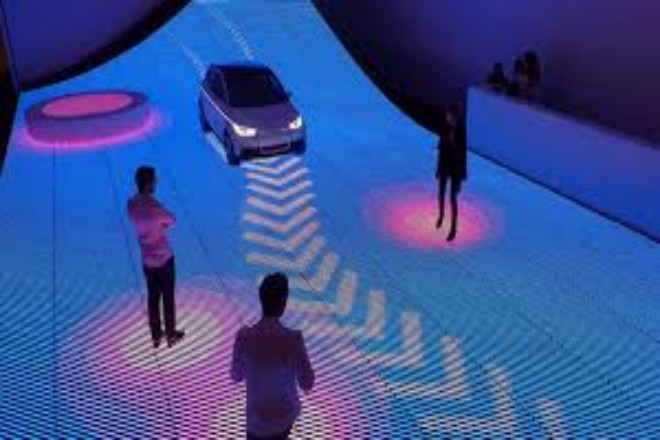
To determine whether your scene is suitable for installing an interactive LED display, you need to consider multiple factors. Here are some key assessment steps and recommendations:
1). Needs analysis
- Target audience:
First, clearly identify who your target audience is. Do they have interaction needs or preferences? For example, if the target audience is young people or tech enthusiasts, they may be more inclined to use interactive displays.
- Information Presentation Needs:
What type of information do you need to present? Is it a simple static image, text, or content that requires dynamic display and interactive operation? Interactive LED displays are more suitable for displaying complex, dynamic information that requires user participation.
2). Scenario assessment
- Space and layout:
Evaluate whether your scene has enough space to install an interactive LED display, and can the display be positioned to ensure good visibility and interactivity? Also, consider the layout and size of the display to ensure it coordinates with the overall design of the scene.
- Lighting and environment:
Consider the lighting conditions and environmental factors in the scene, such as light intensity, reflection, noise, etc. These factors may affect display visibility and user interaction experience.
3). technology matching
- Interaction technology:
Understand and evaluate whether different interaction technologies (such as touch, gesture recognition, voice recognition, etc.) are suitable for your scenario. Consider the maturity, reliability, cost, and user acceptance of the technology.
- Integration and compatibility:
If your scene already contains other technical equipment (such as sound systems, lighting systems, etc.), ensure that the interactive LED display is compatible and integrated with them to achieve a better overall effect.
4). Budget and Cost
- Retour sur investissement:
Evaluate the return on investment of installing an interactive LED display. Consider the purchase cost, installation cost, maintenance cost, and possible benefits of the display (such as advertising revenue, brand exposure, user satisfaction, etc.).
- Budget constraints:
Choose the appropriate display model and configuration based on your budget constraints. Make sure the option you choose is within your budget and meets your needs.
Conclusion
To sum up, interactive LED displays, with their unique interactivity and excellent information display capabilities, have shown broad application prospects and huge market potential in many fields.
From precision marketing in commercial retail to real-time delivery of public information to immersive experiences in education and entertainment, interactive LED displays are reshaping our lifestyles and the way we perceive the world with its unique charm.
Enfin, si vous souhaitez en savoir plus sur les écrans LED, veuillez nous contacter.
